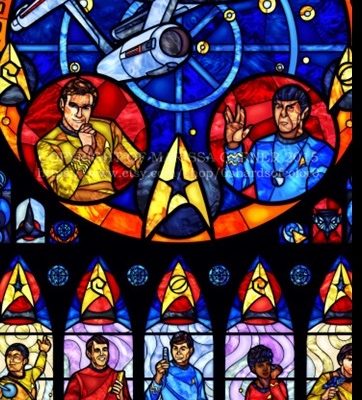Read or Listen
[SPOILERS WARNING: Do I really have to say this? It’s a review! Read ahead at your own risk.]
Several years ago I read The Historian by Elizabeth Kostova as a commuter novel. Then, this past summer, I picked up a used copy of the same book at a charming bookstore in South Eugene. After some speedy binge reading of late-twentieth Century sci-fi, I cracked open Kostova’s speculative fiction about vampires.
Bitten Once … A Vampire Lore Newby
I never considered myself a fan of vampire literature. Still, I stumbled entirely by accident onto The Historian. Then in a Pop-Culture Seminary class, I was briefly exposed to the Twilight movies and subsequently indulged in the guilty pleasure of Stephanie Meyers’ Twilight series. After that, I joined the masses to theaters and even waited in line to see the suspenseful romance of Bella acted out on the big screen. Years later, I was in Scotland for my Ph. D. research and picked up a copy of Bram Stoker’s Dracula. The book has a creepy and well-told beginning but becomes so bogged down by the machismo, over-educated, mansplainer—Abraham Van Helsing, who, by the way, shares the author’s given name (Freud much?). I admit it was challenging to finish the novel and found myself skimming to the end, wondering why we don’t talk more about the fearless and relentless Mina Harker (Murray), who is constantly sidelined as “smart … for a woman.” While Van Helsing became the heroic Vampire Slayer of fiction, having comic books and films made to glorify his heroism, Mina is often overlooked, and truthfully, I had never noticed her name before in popular culture until reading the novel for myself.
Bitten Twice … Exposed
Then, last year, BBC released a 3-part miniseries called Dracula. The series was written and created by Mark Gatiss and Stephen Moffat, famous for some of my favorite Doctor Who episodes and the brilliant BBC Sherlock Holmes series starring Benedict Cumberbatch. I am not a typical horror fanatic. That is to say, I still have the occasional Jaws nightmare and avoid the genre whenever possible. However, my vampiric lust for British literary cinema won out, and I watched the entire miniseries in one afternoon. I was enthralled and in love … with an agnostic Nun named Sister Agatha Van Helsing. Dracula is writ phenomenally. He is a giant of a man and a hell of a monstrosity. But, the star of the series is Agatha and her descendant counterpart, both portrayed by the brilliant and beautiful Dolly Wells. BBC’s Dracula is a magnificent blend of religious commentary, feminism, suspense, and time travel. For this reason, I have now seen the series again with my partner and a third time with my teenage daughter. In a few weeks, I will discuss the first episode with University students as a part of a course I am teaching on Film and Religion, in a topic section entitled, Evil, the Devil, and Horror.
How could I resist the opportunity to reread The Historian when it lept into my vision at Tsunami Books? So I embarked on Kostova’s lengthy, detailed account of Dracula’s historical past, which stretches back to the 15th Century. Kostova’s epistolary novel follows the adventure of an American Historian, an academic who gets distracted from finishing his dissertation by an obsession with researching the potential real-world history of Stoker’s Dracula (as one does). The story also follows his daughter, who refers to her father’s letters to follow his journey through Eastern Europe.
Five academics from two generations chase one another, their letters, and the lore of the Dragon ‘Drakulya’ across time and space. They investigate the histories of the Ottoman Empire, the Wallachian Romanian people, and several monastic orders to uncover the truth behind the so-called fictional character. Along the way, they face enemies in the form of secret orders, spies, and even vampires. As a result, they stuff their pockets with garlic, wear a crucifix when necessary, and tote silver bullets and wooden stakes when they can be carried. The vampire rules are as follows: bitten once, fine. Bitten twice, okay. Bitten thrice, you become a full vampire.
The Historian is an academic novel. Dracula is a true visionary academic, building the world’s most extensive and most complete library in a secret underground monastery. He seeks out academics obsessed with his story and collects them to his purpose—in-house vampire librarians. There is so much to love in Kostova’s novel. It is a story that unveils the historic kernels in a famous fictional account and treats them as fact. Dracula is a natural person, and the reality of vampires is a possibility that haunts the world in subtle ways, mostly terrifying small villages filled with superstitious and ignorant people who either worship the dragon or its saintly medieval conqueror. Thanks also to Kostova for making her vampire slayer and persistent hero a woman, a solid academic, whose daughter follows most proudly in her footsteps.
Bitten Thrice …
I can hardly avoid the label now and will be happy to consider myself a fan of vampire stories. I am pleased to see the counterbalance to Stoker’s proud typically masculine hero in modern portrayals of the Vampire. I should perhaps also mention Buffy the Vampire Slayer, whose feminist-friendly premise certainly helped advance women’s role as fighters against evil. In my opinion, the more women fighting evil, the better. And who is better suited to fight evil than women, whose bodies form, protect, and nurture the next generation of humanity.
Vampires are natural enemies of the light, their lore is mixed up with stories about good saints and religious icons. Anyone interested in the shape of Christianity through history would do well to take a bite of a vampire novel or two.
Vampire Novels:
The Historian by Elizabeth Kostova
Dracula by Bram Stoker
Abraham Lincoln Vampire Slayer by Seth Grahame-Smith
The Twilight Series by Stephanie Meyer
Cinematic Series:
Buffy the Vampire Slayer (1197-2003)
BBC Dracula (2020)
Films:
The Twilight Series (2008-2012)

Dr. Erica Mongé-Greer, holding a PhD in Divinity from the University of Aberdeen, is a distinguished researcher and educator specializing in Biblical Ethics, Mythopoeia, and Resistance Theory. Her work focuses on justice in ancient religious texts, notably reinterpreting Psalm 82’s ethics in the Hebrew Bible, with her findings currently under peer review.
In addition to her academic research, Dr. Mongé-Greer is an experienced University instructor, having taught various biblical studies courses. Her teaching philosophy integrates theoretical discussions with practical insights, promoting an inclusive and dynamic learning environment.
Her ongoing projects include a book on religious themes in the series Battlestar Galactica and further research in biblical ethics, showcasing her dedication to interdisciplinary studies that blend religion with contemporary issues.

